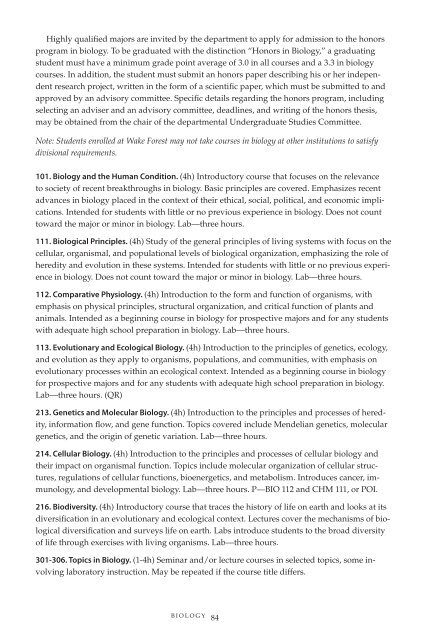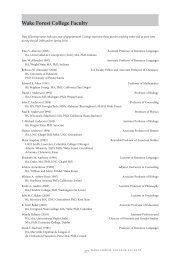theundergraduateschoo ls - Wake Forest University
theundergraduateschoo ls - Wake Forest University
theundergraduateschoo ls - Wake Forest University
Create successful ePaper yourself
Turn your PDF publications into a flip-book with our unique Google optimized e-Paper software.
Highly qualified majors are invited by the department to apply for admission to the honors<br />
program in biology. To be graduated with the distinction “Honors in Biology,” a graduating<br />
student must have a minimum grade point average of 3.0 in all courses and a 3.3 in biology<br />
courses. In addition, the student must submit an honors paper describing his or her independent<br />
research project, written in the form of a scientific paper, which must be submitted to and<br />
approved by an advisory committee. Specific detai<strong>ls</strong> regarding the honors program, including<br />
selecting an adviser and an advisory committee, deadlines, and writing of the honors thesis,<br />
may be obtained from the chair of the departmental Undergraduate Studies Committee.<br />
Note: Students enrolled at <strong>Wake</strong> <strong>Forest</strong> may not take courses in biology at other institutions to satisfy<br />
divisional requirements.<br />
101. Biology and the Human Condition. (4h) Introductory course that focuses on the relevance<br />
to society of recent breakthroughs in biology. Basic principles are covered. Emphasizes recent<br />
advances in biology placed in the context of their ethical, social, political, and economic implications.<br />
Intended for students with little or no previous experience in biology. Does not count<br />
toward the major or minor in biology. Lab—three hours.<br />
111. Biological Principles. (4h) Study of the general principles of living systems with focus on the<br />
cellular, organismal, and populational leve<strong>ls</strong> of biological organization, emphasizing the role of<br />
heredity and evolution in these systems. Intended for students with little or no previous experience<br />
in biology. Does not count toward the major or minor in biology. Lab—three hours.<br />
112. Comparative Physiology. (4h) Introduction to the form and function of organisms, with<br />
emphasis on physical principles, structural organization, and critical function of plants and<br />
anima<strong>ls</strong>. Intended as a beginning course in biology for prospective majors and for any students<br />
with adequate high school preparation in biology. Lab—three hours.<br />
113. Evolutionary and Ecological Biology. (4h) Introduction to the principles of genetics, ecology,<br />
and evolution as they apply to organisms, populations, and communities, with emphasis on<br />
evolutionary processes within an ecological context. Intended as a beginning course in biology<br />
for prospective majors and for any students with adequate high school preparation in biology.<br />
Lab—three hours. (QR)<br />
213. Genetics and Molecular Biology. (4h) Introduction to the principles and processes of heredity,<br />
information flow, and gene function. Topics covered include Mendelian genetics, molecular<br />
genetics, and the origin of genetic variation. Lab—three hours.<br />
214. Cellular Biology. (4h) Introduction to the principles and processes of cellular biology and<br />
their impact on organismal function. Topics include molecular organization of cellular structures,<br />
regulations of cellular functions, bioenergetics, and metabolism. Introduces cancer, immunology,<br />
and developmental biology. Lab—three hours. P—BIO 112 and CHM 111, or POI.<br />
216. Biodiversity. (4h) Introductory course that traces the history of life on earth and looks at its<br />
diversification in an evolutionary and ecological context. Lectures cover the mechanisms of biological<br />
diversification and surveys life on earth. Labs introduce students to the broad diversity<br />
of life through exercises with living organisms. Lab—three hours.<br />
301-306. Topics in Biology. (1-4h) Seminar and/or lecture courses in selected topics, some involving<br />
laboratory instruction. May be repeated if the course title differs.<br />
B I O L O G Y 84






